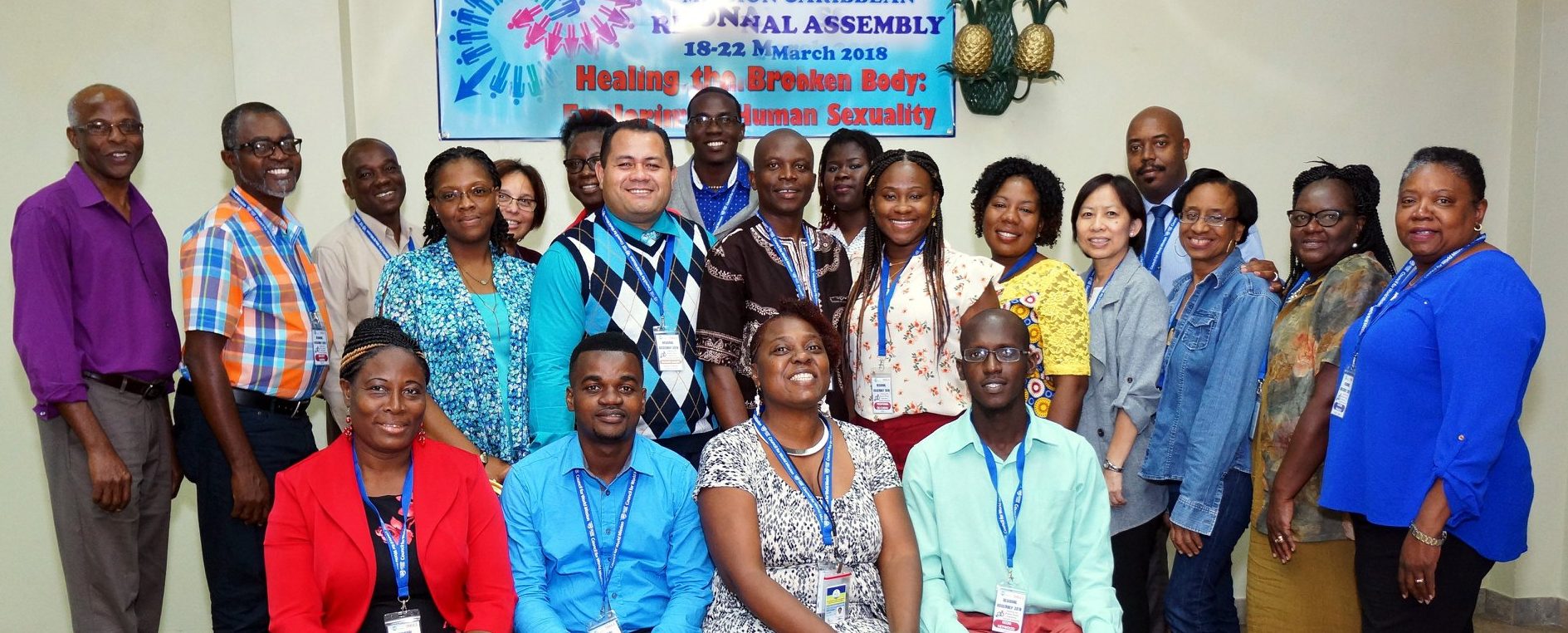 Twenty persons drawn from member churches and ecumenical movements in the Caribbean region of Council for World Mission met for a Regional Assembly themed “Healing the Broken Body – Exploring Human Sexuality” in Kingston, Jamaica between March 18-22, 2018. The Regional Assembly, as a means of engagement in CWM, provides opportunity to spend time learning and discussing emerging issues which require deeper study and understanding.
Twenty persons drawn from member churches and ecumenical movements in the Caribbean region of Council for World Mission met for a Regional Assembly themed “Healing the Broken Body – Exploring Human Sexuality” in Kingston, Jamaica between March 18-22, 2018. The Regional Assembly, as a means of engagement in CWM, provides opportunity to spend time learning and discussing emerging issues which require deeper study and understanding.
Human sexuality was identified as an area requiring discussion and learning when both CWM Caribbean region’s member churches Guyana Congregational Union (GCU) and The United Church in Jamaica and the Cayman Islands (UCJCI) met for their annual regional interaction in the 2017 Members’ Mission Forum.
 Worship was led by Rev. Nicole Ashwood who encouraged reflection on the nature of brokenness of people and brokenness of the church. Recognising that human sexuality has not been an easy topic for the church in the Caribbean context to talk about, presenters used the settings of the margins, beyond borders and popular culture to explore the issues. Data on sex and sexuality in the Caribbean also provided statistics on practices and perspectives.
Worship was led by Rev. Nicole Ashwood who encouraged reflection on the nature of brokenness of people and brokenness of the church. Recognising that human sexuality has not been an easy topic for the church in the Caribbean context to talk about, presenters used the settings of the margins, beyond borders and popular culture to explore the issues. Data on sex and sexuality in the Caribbean also provided statistics on practices and perspectives.
Canon Garth Minott of the United Theological College of the West Indies challenged the member churches to be honest, and talk about sex in their congregations, use data, be guided by the bible and theology and focus on building community. The latter is especially importance as the Assembly participants heard how popular culture, particularly music, expressed sexuality in ways that are derogatory to women and promote violence against homosexuals.
The exposure visit to the National Family Planning Board, an Agency of the Ministry of Health in Jamaica, allowed participants to learn about how work is done in communities to provide guidance, leadership, advocacy and implementation of quality, equitable sexual health education and services.
 Rev. Gary Harriott guided the group to re-read biblical texts, particularly those referencing homosexuality, noting that in the face of differing positions on human sexuality, it was important for the church to be an environment which creates space for conversation and understanding of the bible and the communities it serves.
Rev. Gary Harriott guided the group to re-read biblical texts, particularly those referencing homosexuality, noting that in the face of differing positions on human sexuality, it was important for the church to be an environment which creates space for conversation and understanding of the bible and the communities it serves.
In a final session entitled “So What?”, participants were encouraged to answer the questions: “What will we do? What will we say? How will all this make a difference?” Reflecting on strategies for Congregational Engagement, Leadership Capacity Development and Youth Engagement, ideas were proposed for building awareness of gender-based violence, child abuse and stigmatization of persons with HIV/AIDS.
 Among views expressed were the need to advocate for the affirmation of the whole people of God, to accompany talk of love for people with practical action, to be deliberate in informing ourselves about human sexuality instead of simply holding opinions and pursuing contextual theological discourse.
Among views expressed were the need to advocate for the affirmation of the whole people of God, to accompany talk of love for people with practical action, to be deliberate in informing ourselves about human sexuality instead of simply holding opinions and pursuing contextual theological discourse.
Notably, this was agreed by the participants through affirmation and commitment:
We affirm that every individual is made in the image of God regardless of choices in life, identities and diversity.
We commit to continued prayer, discernment, discussions and explorations as we seek the mind of God on issues related to human sexuality.
Assembly participants in collaboration with the leadership of the member churches have committed to seeking opportunities for conversations towards policy development and practice in developing missional congregations.


